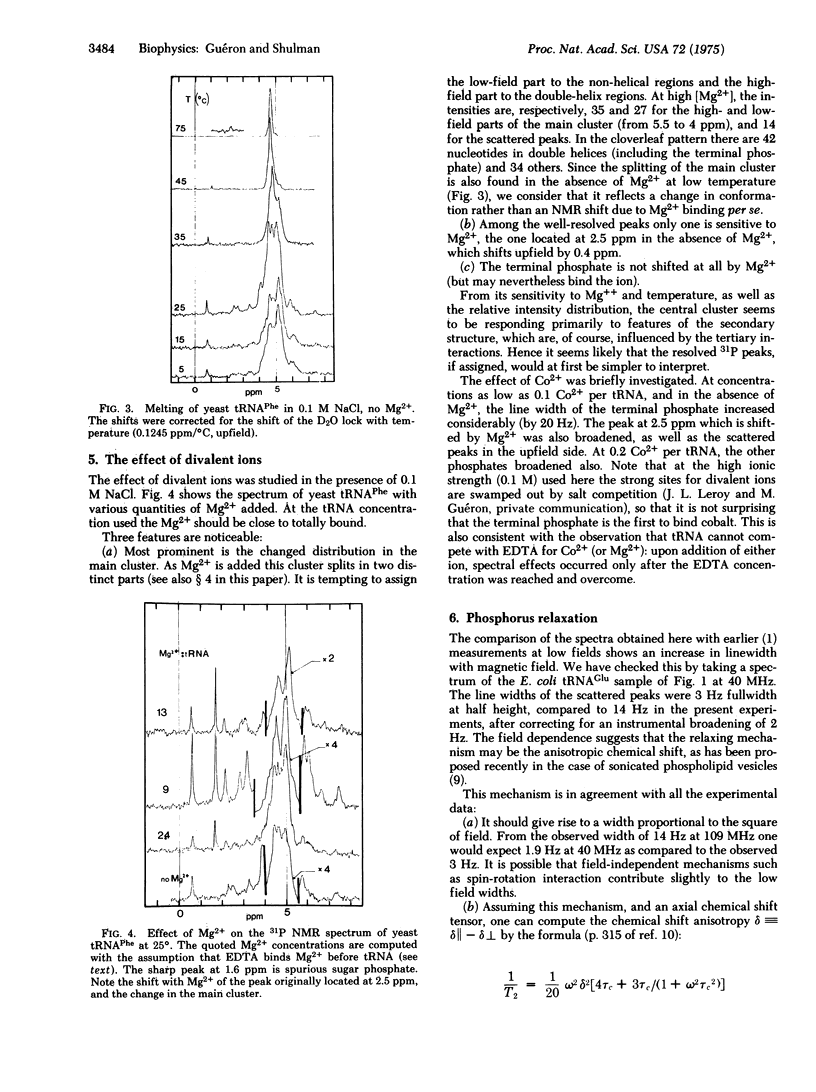Abstract
We have observed well-resolved 31P resonances at 65 kG (109 MHz) in solutions of Escherichia coli tRNAGlu and yeast tRNAPhe. One resolved resonance, identified as the terminal phosphate, titrates with a pK = 6.35. Upon melting the yeast tRNAPhe in 0.1 M NaCl, without Mg++, the resolved peaks broaden and disappear in the vicinity of 35 degrees while the central cluster narrows drastically, shifts slightly, and loses its structure. Addition of Mg++ shifts one resolved peak and changes the shape of the cluster. The 31P lines are broader when observed at 65 kG than at 24 kG. The broadening is shown to come from chemical shift anisotropy which is estimated to be about 140 ppm.
Full text
PDF



Selected References
These references are in PubMed. This may not be the complete list of references from this article.
- Adams A., Lindahl T., Fresco J. R. Conformational differences between the biologically active and inactive forms of a transfer ribonucleic acid. Proc Natl Acad Sci U S A. 1967 Jun;57(6):1684–1691. doi: 10.1073/pnas.57.6.1684. [DOI] [PMC free article] [PubMed] [Google Scholar]
- Berden J. A., Cullis P. R., Hoult D. I., McLaughlin A. C., Radda G. K., Richards R. E. Frequency dependence of 31P NMR linewidths in sonicated phospholipid vesicles: effects of chemical shift anisotropy. FEBS Lett. 1974 Sep 15;46(1):55–58. doi: 10.1016/0014-5793(74)80333-9. [DOI] [PubMed] [Google Scholar]
- Guéron M. 31P magnetic resonance of purified tRNA. FEBS Lett. 1971 Dec 15;19(3):264–266. doi: 10.1016/0014-5793(71)80529-x. [DOI] [PubMed] [Google Scholar]
- Hilbers C. W., Shulman R. G., Kim S. H. High resolution NMR study of the melting of yeast tRNA Phe. Biochem Biophys Res Commun. 1973 Dec 10;55(3):953–960. doi: 10.1016/0006-291x(73)91235-7. [DOI] [PubMed] [Google Scholar]
- MANDEL M., WESTLEY J. W. NUCLEAR MAGNETIC RESONANCE OF PHOSPHORUS IN DEOXYTHYMIDINE POLYNUCLEOTIDES. Nature. 1964 Jul 18;203:301–302. doi: 10.1038/203301b0. [DOI] [PubMed] [Google Scholar]
- Patel D. J. Peptide antibiotic-dinucleotide interactions. Nuclear magnetic resonance investigations of complex formation between actinomycin D and d-pGpC in aqueous solution. Biochemistry. 1974 May 21;13(11):2388–2395. doi: 10.1021/bi00708a024. [DOI] [PubMed] [Google Scholar]
- Riesner D., Maass G., Thiebe R., Philippsen P., Zachau H. G. The conformational transitions in yeast tRNAPhe as studied with tRNAPhe fragments. Eur J Biochem. 1973 Jul 2;36(1):76–88. doi: 10.1111/j.1432-1033.1973.tb02887.x. [DOI] [PubMed] [Google Scholar]
- Weiner L. M., Backer J. M., Rezvukhin A. I. 31P-NMR studies of tRNA. FEBS Lett. 1974 Apr 15;41(1):40–42. doi: 10.1016/0014-5793(74)80948-8. [DOI] [PubMed] [Google Scholar]



